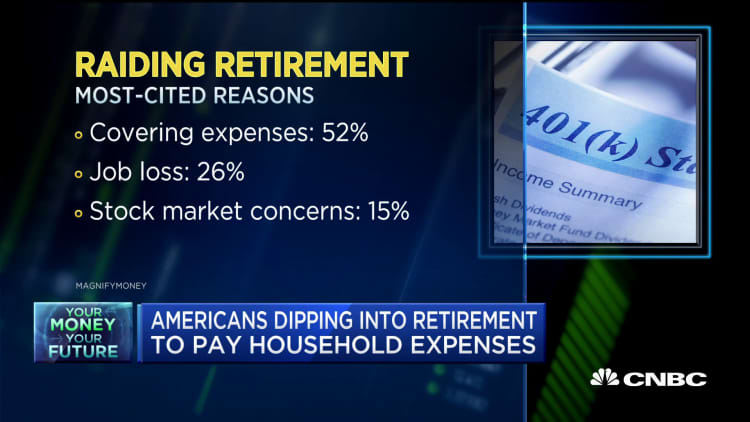Prospective retirees often face one big question: How long can my funds last?
Now, a mainstay for retirement — Social Security — is facing the very same question.
Social Security relies on the money in its trust funds, from which it pays a portion of its benefits.
And the money disbursed to Amercians every year is no small amount.
About 65 million people will receive approximately $1 trillion in benefits this year, according to the Social Security Administration. Retired workers account for 45 million of those people, for a total of $67.7 billion each month. Their average monthly benefit is $1,503.
More from Personal Finance:
What to know if you plan to claim Social Security during Covid-19
Here's how much Medicare could cost you in retirement
Here's an easy, low-cost way to build a retirement plan like the pros
How long Social Security's funds will last had been a nagging question even before the coronavirus pandemic.
But now researchers are saying that the virus and its economic aftereffects could reduce the pot of money more quickly.
In April, the SSA said the trust funds could be depleted in 2035. At that point, the system will be able to pay 79% of promised benefits. (The remainder comes from payroll taxes paid by employers and employees.)
However, as the pandemic has worn on, other research has been more pessimistic.
A May report from The Wharton School at the University of Pennsylvania found that the trust funds could run dry as early as 2032.

Then, in June, the Committee for a Responsible Federal Budget, a non-partisan organization, pinned its projections on as soon as 2031.
Someone who turns 62 today is going to be 73 when the trust funds run out, said Marc Goldwein, senior vice president and senior policy director at the Committee for a Responsible Federal Budget, during a recent webcast.
"This isn't a program you've got to save for your grandkids," Goldwein said. "It's a program you've got to save for your grandparents."
Lawmakers could make changes before Social Security reaches that point. That could include raising taxes, benefit cuts or a combination of both.
Retirees are already likely feeling the strain of that budget shortfall.
I don't think the way we calculate a benefit today is going to be the same for people who are claiming benefits 40 years from now.Joe Elsasserpresident and CEO of Covisum
Social Security benefits have lost 30% of their buying power since 2000, according to research from the Senior Citizens League, a nonpartisan senior group.
What's more, there may be no annual increase to benefits for 2021 based on decreasing consumer prices. The annual cost-of-living adjustment is calculated each year based on consumer price index data. Last year, recipients got a 1.6% bump.
Still, the outlook for Social Security is not all doom and gloom. Individuals, even those as young as millennials, should still plan to have some income from Social Security in their retirement years, according to Joe Elsasser, president and CEO of Covisum, a Social Security claiming software company.
But it would be wise to increase retirement savings with the anticipation that the benefits you receive may not be as rich as what the government provides retired workers today.
"It's absolutely fair to plan for benefit cuts," Elsasser said. "I don't think the way we calculate a benefit today is going to be the same for people who are claiming benefits 40 years from now."


